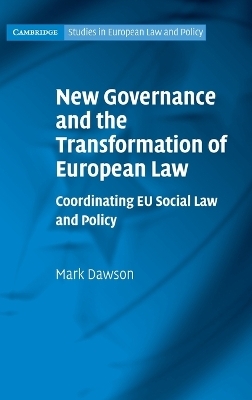
New Governance and the Transformation of European Law
Coordinating EU Social Law and Policy
Seiten
2011
Cambridge University Press (Verlag)
978-1-107-00632-4 (ISBN)
Cambridge University Press (Verlag)
978-1-107-00632-4 (ISBN)
Mark Dawson charts the development of 'new governance' methods in the EU, arguing that these soft law methods constitute a new phase of EU legal integration in which executives, NGOs and networks, rather than Courts, have become central actors.
The development of non-binding new governance methods has challenged the traditional ideals of EU law by suggesting that soft norms and executive networks may provide a viable alternative. Rather than see law and new governance as oppositional projects, Mark Dawson argues that new governance can be seen as an example of legal 'transformation', in which soft norms and hard law institutions begin to cohabit and interact. He charts this transformation by analysing the Open Method of Coordination (OMC) for Social Inclusion and Protection. While this process illustrates some of the concrete advantages for EU social policy which new governance has brought, it also illustrates their extensive legitimacy challenges. Methods like the OMC have both excluded traditional institutions, such as Courts and Parliaments, and altered the boundaries of domestic constitutional frameworks. The book concludes with some practical suggestions for how a political 'constitutionalisation' of new governance could look.
The development of non-binding new governance methods has challenged the traditional ideals of EU law by suggesting that soft norms and executive networks may provide a viable alternative. Rather than see law and new governance as oppositional projects, Mark Dawson argues that new governance can be seen as an example of legal 'transformation', in which soft norms and hard law institutions begin to cohabit and interact. He charts this transformation by analysing the Open Method of Coordination (OMC) for Social Inclusion and Protection. While this process illustrates some of the concrete advantages for EU social policy which new governance has brought, it also illustrates their extensive legitimacy challenges. Methods like the OMC have both excluded traditional institutions, such as Courts and Parliaments, and altered the boundaries of domestic constitutional frameworks. The book concludes with some practical suggestions for how a political 'constitutionalisation' of new governance could look.
Mark Dawson is an Assistant Professor of European Law at Maastricht University. He is a member of the editorial board of the Maastricht Journal of European and Comparative Law and the co-director of Maastricht University's English language LLM programmes in International Laws, Globalisation and Law and European Law School. He is also a scholar within the Maastricht Centre for European Law.
Introduction; 1. The origins of an open method of coordination; 2. Relating governance and law; 3. Governance as proceduralisation; 4. Assessing the procedural paradigm: the case of the OMC SPSI; 5. Constitutionalising new governance; Epilogue.
| Reihe/Serie | Cambridge Studies in European Law and Policy |
|---|---|
| Verlagsort | Cambridge |
| Sprache | englisch |
| Maße | 155 x 235 mm |
| Gewicht | 720 g |
| Themenwelt | Recht / Steuern ► Arbeits- / Sozialrecht ► Sozialrecht |
| Recht / Steuern ► EU / Internationales Recht | |
| Sozialwissenschaften ► Politik / Verwaltung ► Europäische / Internationale Politik | |
| ISBN-10 | 1-107-00632-5 / 1107006325 |
| ISBN-13 | 978-1-107-00632-4 / 9781107006324 |
| Zustand | Neuware |
| Haben Sie eine Frage zum Produkt? |
Mehr entdecken
aus dem Bereich
aus dem Bereich
meine Rechte: Wohnen, Arbeiten, Steuern, Mobilität
Buch | Softcover (2024)
C.H.Beck (Verlag)
11,90 €
Textausgabe mit ausführlichem Sachverzeichnis
Buch | Softcover (2024)
dtv Verlagsgesellschaft
20,90 €


